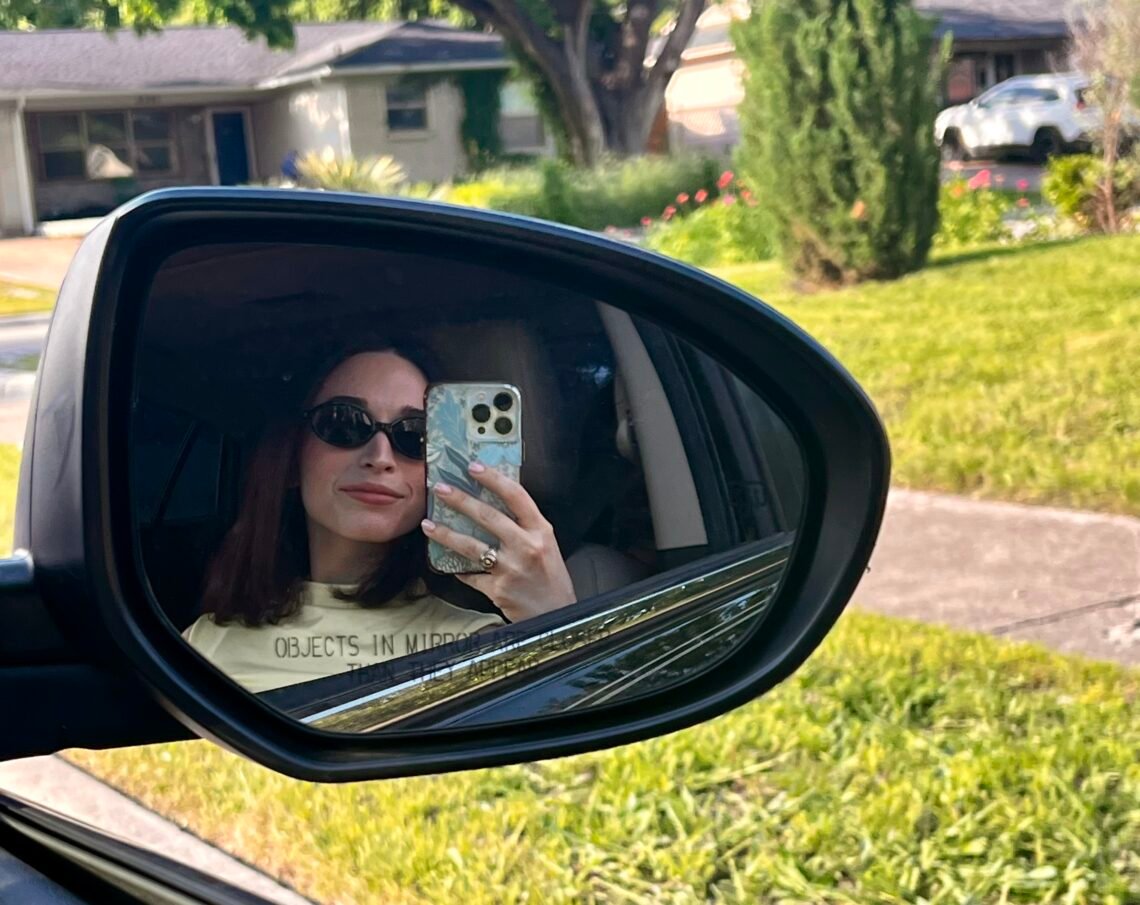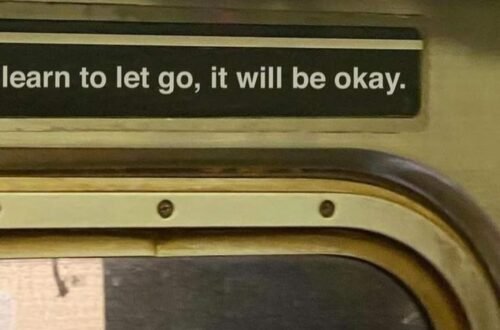A few months ago, I rediscovered the song “Mirrors” by Justin Timberlake. I know, I know—he’s controversial. But let’s focus on the music, people! That 8-minute pop epic from 2013 hit me like a nostalgic freight train: euphoria, yearning, teenage memories in Forever 21 (R.I.P.) dressing rooms. I played it on repeat until it became background noise and finally had to bench it from my 7 a.m. Spotify commute playlist for the sake of sanity.
Then, one weekend in April during a visit to Austin, a young couple riding in the backseat of the car I was in queued it up, and suddenly, there it was again—my old friend Mirrors—just as soul-stirring as the first time. And with it came a thought, soft but resounding:
What if everyone around me is a mirror, reflecting back some version of myself? Now, before you roll your eyes like this is about to become an ayahuasca-fueled TED Talk, stay with me.
I sat with the thought: What if the people around us are just reflecting versions of ourselves—both the flattering angles and the ones we crop out, Facetune edit, or try to outgrow?
Alexa, Play “Reflection” by Mulan
As a woman, I’ve spent an Olympic-level amount of time looking in the mirror. How are my lashes holding up? Is that a new under-eye wrinkle or just bad lighting? Should I get a chemical peel? Is my hair giving “cool girl” or “medieval wench”? And honestly, how many sit-ups does it take to look like Kendall Jenner by the Fourth of July? Don’t look at my Google history.
Look, I never said I was enlightened—I’m just a girl. A girl armed with a magnifying mirror and deeply rooted societal conditioning.
Seconds, minutes, hours—years, if we’re being honest—have been spent inspecting my reflection. Contemplating self-improvement for improvement’s sake. Picking my reflection apart, trying to optimize it. If I could just fix this one thing (cue: the eyebrow that never quite arches like her sister), then maybe—maybe—I’d feel whole. What I saw in the mirror was never the full picture, just a warped view curated by insecurity and comparison.
Sounds like a colossal waste of time, doesn’t it? And yet, while our own reflection is important, the kind that’s obsessed with becoming a palatable, perfected image isn’t the kind of reflection I’m talking about. Not really.
There’s surface level reflection–the one society has conditioned women (and men, in some fashion) to hastily nip and tuck and peel and wax–and then there’s the real you. The one who’s inner thoughts and overall mentality project onto surface level you…and evidently onto others.
Because if I can’t even see myself clearly, and if other people are mirrors, then aren’t they just reflecting back a warped version, too?
Are you still with me?
It’s a profound thought disguised as a Pinterest quote. It all goes back to the classic Golden Rule: Treat others the way you want to be treated. If I want kindness and respect from others, I should offer it to them first. Simple, right?
Not so fast, young grasshopper. Let’s dig deeper.
What about: If I want kindness and respect from others… shouldn’t I also be giving those things to myself? Now we’re getting somewhere. Let’s put this into practice?
Mirror, Mirror on My Vanity
Is there someone in your life who drives you absolutely bananas? Perhaps it’s a coworker who really grinds your gears. The one who triggers a 5-minute voice memo to your best friend the second you leave work. Thank you, Apple, for empowering a generation’s inner chaos with the power to produce podcast-length rants at our fingertips. We are forever grateful!
Or maybe it’s your parent or guardian who just doesn’t understand what it’s like to be a GenZ/Millennial and blames it on ‘the damn phones’ (okay, they may be right about that).
Whomever it is, ask yourself: How am I showing up in these interactions? What about me might be feeding this dynamic? And on the flip side, what about them is revealing something about me—some subconscious wound, belief, or behavior I haven’t quite reckoned with?
Maybe it’s not about being right or wrong. Maybe it’s just about noticing. Notice, reflect, ask. Awareness is the first step in alchemy, after all.
The Company We Keep (and Reflect)
Okay, so we are becoming aware. Now zoom out. Consider your relationships in the broader sense—friendships, family ties, romantic entanglements. Every person in your inner circle reflects a part of you back to yourself. They’re like living, breathing time capsules—reminders of who you’ve been, and sneak previews of who you’re becoming.
Which means—brace yourself—you should be incredibly picky about who you let hold the mirror.
Ever heard the phrase,“Tell me who your friends are and I’ll tell you who you are?” It sounds like something your mom told you in junior high when you started hanging out with that girl who wore eyeliner in her waterline and had a vape before vapes were mainstream (we love a trailblazer). But there’s truth in it. The people around you shape your reality. Period.
Let’s say you have a friend—we’ll call her Mildred (apologies to any actual Mildreds out there; this is not about you). You feel like you’re a solid, supportive friend to her, but she’s always late, constantly critiques your outfits, and—oh yeah—forgot your birthday. Meanwhile, she seems to remember her other friends’ birthdays just fine, and her Instagram is littered with heart emojis under their selfies. Something’s off, right?
Now ask yourself: What is Mildred seeing reflected in her dynamic with me that might be causing this? Maybe she’s threatened. Maybe you mirror a version of her she hasn’t accepted—or one she resents not becoming. Maybe her passive aggression is just emotional indigestion, and you’re the unlucky burrito.
So why do we keep making plans with people like Mildred? Maybe because deep down, we don’t believe we deserve better. Maybe because the version of ourselves they reflect is one we haven’t fully grown out of yet. Or maybe, if we’re being brutally honest, their inconsistency feels familiar—and familiarity is powerful, even when it hurts. Ouch!
If you’re friends with a Mildred—or you’ve realized you are the Mildred—how can you show up differently for yourself and others, so you start reflecting the kind of treatment you actually want to receive?
Love and Other Funhouse Mirrors
“But Celeste, what about romantic relationships?”
Ah. Now we’re getting to the juicy stuff.
Whether you’re into men, women, or nonbinary babes, the people we allow in romantically are perhaps the clearest mirrors we have. They reflect back our deepest beliefs about love, worthiness, and what we think we deserve—often before we even realize what those beliefs are.
Maybe we think we have some control over this so-called “reflection.” If you’re on the dating apps (God bless your soul), you can easily filter the dating pool from the tall and short, the young and the older and the mile radius you’d like to cast your dating net in. But true, authentic connection is like filtering salt crystals out of beach sand: it takes time and immense patience.
We don’t just fall in love with people—we fall in love with the parts of ourselves they mirror back to us. And when those relationships end, it’s not just heartbreak. It’s grief for the version of ourselves we thought we were becoming.
The Realest Reflection
As Mulan famously sang: When will my reflection show who I am inside? No, because she was so real for that. Valid question, girl. Let’s think about this.
If I constantly tell myself, “I’m so stupid, I can’t do this,” slowly but surely I will create neural pathways that are built on this “truth.” Not because it is true, but because I’ve repeated it with enough conviction—or said it with enough emotion—that my body believes it. And not only does my brain start to believe it, but so does everyone around me. That becomes the reflection I send out to the world and, like a boomerang, the one I receive in return.
The thoughts you think, the words you speak about yourself—those become your truth. Whatever you think about yourself is right. “I can’t do this.” Okay, you’re right. “I can do anything” Okay, you’re right.
So when will your reflection show you as who you actually are? I’ll tell you when. When you are brave enough to show up unapologetically as your authentic self and accept that not everyone has the capacity or self-awareness to do so. The “and” in that previous sentence is crucial, because if you are not able to recognize the humanity of others, then you sure as hell won’t be able to recognize it in yourself.
Be the Mirror You Want to See
Let’s get one thing clear: we have zero control over others. We cannot control what they do, say, post, or ghost. The only thing we can control is how we show up. How we speak to ourselves. How we set boundaries. How we soften or armor up.
So the next time someone makes you feel like crap—or like a queen—pause. Take a look in the proverbial mirror. What are they reflecting back to you? And what does that say about where you are on your journey?
Sometimes, the most uncomfortable reflections are the ones that teach us the most. And sometimes, they’re just bad lighting. It’s up to you to decide which is which.
Either way, you get to choose what you do with the image staring back at you.
Turns out, Justin Timberlake was onto something. We are each other’s mirrors. Maybe your own reflection is saying: Just put your hand on the glass, I’m here trying to pull you through. You just gotta be strong.
And the more honestly we face what’s being reflected, the more clearly we see who we really are—and who we want to become.






2 Comments on “Everyone is a Mirror: Do You Like What You See?”